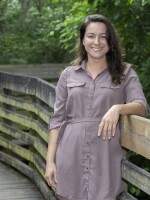MICHEL MARTIN, HOST:
Early this year, the U.S. Environmental Protection Agency is expected to officially set limits on six so-called forever chemicals, known as PFAS, in drinking water. One community that has seen elevated levels of two of these forever chemicals is Tampa, Fla. And now the city says it will likely be the first in the country to bring in a new technology that will make it easier to filter out these PFAS. Joining us now to tell us more about the city's plans is Jessica Meszaros with WUSF in Tampa. Jessica, welcome. Thanks for joining us.
JESSICA MESZAROS, BYLINE: Thank you for having me.
MARTIN: So could you just start by reminding us what PFAS chemicals are?
MESZAROS: Sure. So. PFAS actually stands for a large family of toxic man-made chemical compounds. They've been used in consumer and industry products since the 1940s, from clothing, upholstery and carpet to microwave popcorn bags, pizza boxes and even candy wrappers. They've been linked to negative health effects for people. Exposure to certain levels can impact the body's ability to fight infections and lead to reproductive effects or an increased risk of cancer. At this point, they are everywhere, so they end up in the water supply. Here's Sarah Burns with Tampa's water department.
SARAH BURNS: We are passive receivers, so we don't generate a single drop of PFAS. It just comes to us in our source water.
MESZAROS: The utility is actually part of a lawsuit against manufacturers of PFAS, like 3M and DuPont, to recover the cost of removal.
MARTIN: So tell us about this big new technology that Tampa is bringing in.
MESZAROS: Yeah, the city of Tampa is getting the technology from the Netherlands. It's called SIX, or suspended ion exchange. It removes things like decaying vegetation from the water. And the city says to filter out PFAS, you have to first remove the organic matter. Tampa's water department would be the first in the country to have this system. The other two are in Europe, and the plan for this one is to filter 140 million gallons a day.
MARTIN: Can I ask, though, why is this needed? Is Tampa's water that bad?
MESZAROS: Well, it's not that the water is bad. It's just that the city gets its drinking water from the Hillsborough River, which is collected along with all sorts of organic matter from nature. Now, Tampa did recently find slightly elevated levels of two of six PFAS in its drinking water supplies. The EPA proposed limit is at four parts per trillion for these two, and the highest the city found in its water was just over six.
MARTIN: This sounds expensive. How is this going to be paid for?
MESZAROS: Well, Tampa is still in the designing phase, and the system won't be completed until about 2032. But Tampa's more than 700,000 water customers are already paying for it. It's expected to cost $200 million, and it's part of a larger infrastructure improvement plan that the city council already approved, so their water bills will be increasing every October until 2040. That said, city officials do point out that the technology will actually save the department nearly a million and a half dollars a year.
MARTIN: And how? How will it save that money?
MESZAROS: Well, installing this SIX system means they'll use less chemicals and filters. Sarah Burns said if they weren't using this, they'd have to otherwise go through double the filters. Plus, getting the organic matter out of the water early on in the treatment process actually improves all the other stages that follow, so it makes the system a lot more efficient.
MARTIN: That's Jessica Meszaros with WUSF in Tampa. Jessica, thank you so much.
MESZAROS: Thank you.
(SOUNDBITE OF MUSIC) Transcript provided by NPR, Copyright NPR.
NPR transcripts are created on a rush deadline by an NPR contractor. This text may not be in its final form and may be updated or revised in the future. Accuracy and availability may vary. The authoritative record of NPR’s programming is the audio record.

